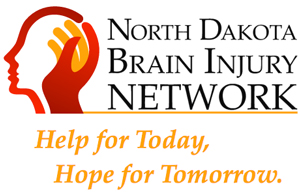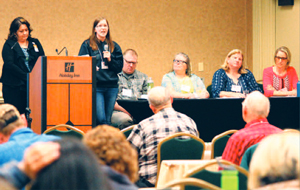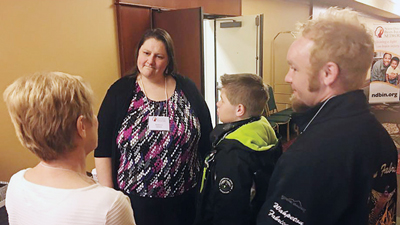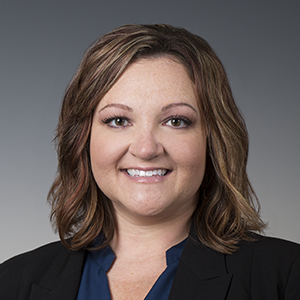Mind Matters
Conference on brain injury brings together health professionals, caregivers, and family members.
By Nikki Massmann on
North Dakota is home to a unique annual conference that brings together both healthcare professionals and patients. The Mind Matters Conference on Brain Injury is coordinated by the North Dakota Brain Injury Network (NDBIN) housed within the Center for Rural Health at the UND School of Medicine & Health Sciences.

The conference attracts a diverse, multidisciplinary range of professionals because of the array of providers needed to successfully support individuals who have sustained a brain injury. Physicians, nurses, rehabilitation professionals, behavioral health counselors, educators, vocational specialists, paraprofessionals, individuals with brain injury, and family members all come together once a year to discuss the latest research, trends, practice strategies, and collaborative models of care for individuals with brain injury. The 2016 conference saw its highest attendance to date: 131 total attendees, 62 of whom were brain injury survivors or family members.
Each year in North Dakota, an estimated 3,693 individuals sustain a traumatic brain injury (TBI). More than 13,000 North Dakotans are currently living with a long-term disability from TBI. The Mind Matters Conference is an opportunity to bring a personal element to these statistics and raise awareness of the issues TBI survivors face in getting the care and support they need for daily life. Experts on brain injury and its effects present the latest information on caring for those with brain injury.
Rebecca Quinn, program director of the North Dakota Brain Injury Network, is a member of the Mayo Clinic Brain Injury Advisory Committee. Through this relationship, the Mayo Clinic, which is a national traumatic brain injury model system, sends a speaker to the conference each year as part of their dissemination efforts for research on brain injury.
"Mayo's partnership with our conference is so beneficial," Quinn said. "We are able to provide the latest and most innovative information to our attendees. It also provides an informal connection to Mayo's expertise for North Dakota's network of health professionals who work with individuals with brain injury."
Additional local, state, and national experts on a multitude of brain injury topics round out the conference's agenda. Attendees receive continuing education credits. The attendees include health professionals from the fields of social work, nursing, audiology, addiction counseling, counseling, and psychology. The conference is supported by partner organizations throughout North Dakota, including Sanford Health, Onword Therapy, Progressive Therapy, Heartview Foundation, North Dakota Protection and Advocacy, St. Sophie's, and Community Options.
"These partners provide valuable input and support to the Mind Matters Conference," Quinn said. "Because they all specialize in different aspects of the care a brain injury survivor needs, their involvement contributes to a conference agenda with topics on anything from speech therapy and daily coping mechanisms to dealing with addiction."
Other supporting organizations will send speakers and exhibitors as well. Quinn said, "In addition to our experts from larger facilities within North Dakota, many of our exhibitors and speakers come from outside the state. Some of our population receive specialized care out-of-state, and those out-of-state facilities need somewhere to send their patients home to. Because of this, community-based services are a big need in our state, and those larger organizations are happy to help out with training and presentations to help build our capacity within the state to care for brain injury survivors, particularly in rural areas."

The highlight of the Mind Matters Conference each year is the panel discussion by brain injury survivors. Even though its content wouldn't count toward continuing education credits, the planning committee wouldn't cut it from the agenda because of its effect on attendees.
"The panel is a guided discussion about recovery, coping mechanisms, and sharing their stories in general on how they acquired their brain injuries, and how it affects their daily lives," Quinn said. "The attendees that are survivors really relate to the panelists' stories, and the health professional attendees appreciate getting to hear that perspective from clientele and patients. It's a powerful and moving part of the conference."
This year's Mind Matters Conference was especially important for one North Dakota family, the Medenwalds, and Quinn. During the year leading up to the conference, Jeremiah Medenwald and his mother, Roxann, were struggling to find appropriate care for the resulting effects of Jeremiah's brain injury. Although they had spoken over the phone throughout the year, Quinn and the Medenwalds had never met in person. When Roxann arrived at the conference, she greeted Quinn with tears of gratitude.

"Rebecca is our family's angel," said Roxann. "Because of her and the North Dakota Brain Injury Network, Jeremiah gets to spend time with his son and his family. He has an understanding of how to take care of himself following his brain injury. Before I met Rebecca, I was hitting brick walls trying to find appropriate resources."
Brain injury can be such an isolating condition.
For Quinn, meeting the families and seeing them connect with each other is priceless. "Brain injury can be such an isolating condition. The conference provides them with a forum for peer networking and learning about the science behind their conditions. It's not your typical conference since it blends survivors and health professionals. It ends up being a familial environment. For us health professionals, it really reenergizes our purposes as advocates for brain injury survivors and support services throughout North Dakota."
The annual Mind Matters Conference on Brain Injury is facilitated by the North Dakota Brain Injury Network (NDBIN), housed at the Center for Rural Health at the University of North Dakota School of Medicine & Health Sciences. NDBIN is funded by the North Dakota Department of Health & Human Services. For more information on Mind Matters, visit www.ndbin.org.
This article originally appeared in the Summer 2016 issue of North Dakota Medicine.


 is the Director of Communications at the Energy and Environmental Research Center (EERC). Prior to her position at the EERC, she served as Communication Coordinator at the Center for Rural Health at the University of North Dakota's School of Medicine & Health Sciences.
is the Director of Communications at the Energy and Environmental Research Center (EERC). Prior to her position at the EERC, she served as Communication Coordinator at the Center for Rural Health at the University of North Dakota's School of Medicine & Health Sciences.



